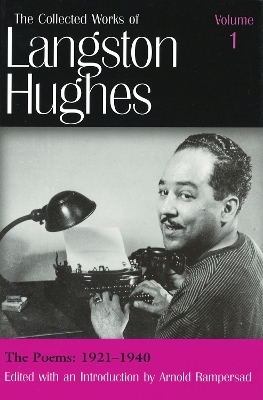
The Collected Works of Langston Hughes v. 1; Poems 1921-1940
Seiten
2001
University of Missouri Press (Verlag)
978-0-8262-1339-6 (ISBN)
University of Missouri Press (Verlag)
978-0-8262-1339-6 (ISBN)
- Titel z.Zt. nicht lieferbar
- Versandkostenfrei
- Auch auf Rechnung
- Artikel merken
This volume includes the complete texts of Hughes' first book, ""The Weary Blues"" (1926), and his second, ""Fine Clothes to the Jew"" (1927), as well as other poems published by him during and after the Harlem Renaissance. The poems contained deal with the African American experience.
The first three volumes of Missouri's landmark Collected Works of Langston Hughes comprise all of his published poetry. Although he worked in a variety of forms, Hughes was above all a poet. From 1921, when his first poem. ""The Negro Speaks of Rivers,"" appeared in a national magazine, until 1967, when his last volume appeared shortly after his death, he remained faithful to his central goal - to be a poet of the African American and American experience, creating verse that honored the culture of black American and the ideals of the nation. Volume 1 includes the complete texts of Hughes's first book, The Weary Blues (1926), and his second, Fine Clothes to the Jew (1927), as well as other poems published by him during and after the Harlem Renaissance. The Weary Blues announced the arrival of a rare voice in American poetry. A literary descendant of Walt Whitman (""I, too, sing America,"" Hughes wrote), he chanted the joys and sorrows of black America in unprecedented language. A gifted lyricist, he offered rhythms and cadences that epitomized the particularities of African American creativity, especially jazz and the blues. His second volume, steephed in the blues and controversial because of its frankness, confirmed Hughes as a poet of uncompromising integrity. Then, in the 1930s especially, came the radical poetry included in Dear Lovely Death (1934) and A New Song (1938). For example, ""Good Morning Revolution"" and ""Let American Be America Again"" made his pen one of the most forceful in America during the Great Depression.
The first three volumes of Missouri's landmark Collected Works of Langston Hughes comprise all of his published poetry. Although he worked in a variety of forms, Hughes was above all a poet. From 1921, when his first poem. ""The Negro Speaks of Rivers,"" appeared in a national magazine, until 1967, when his last volume appeared shortly after his death, he remained faithful to his central goal - to be a poet of the African American and American experience, creating verse that honored the culture of black American and the ideals of the nation. Volume 1 includes the complete texts of Hughes's first book, The Weary Blues (1926), and his second, Fine Clothes to the Jew (1927), as well as other poems published by him during and after the Harlem Renaissance. The Weary Blues announced the arrival of a rare voice in American poetry. A literary descendant of Walt Whitman (""I, too, sing America,"" Hughes wrote), he chanted the joys and sorrows of black America in unprecedented language. A gifted lyricist, he offered rhythms and cadences that epitomized the particularities of African American creativity, especially jazz and the blues. His second volume, steephed in the blues and controversial because of its frankness, confirmed Hughes as a poet of uncompromising integrity. Then, in the 1930s especially, came the radical poetry included in Dear Lovely Death (1934) and A New Song (1938). For example, ""Good Morning Revolution"" and ""Let American Be America Again"" made his pen one of the most forceful in America during the Great Depression.
About the Editor Arnold Rampersad is Professor Emeritus of English at Stanford University in California. He is the author, coauthor, or editor of numerous publications, including The Life of Langston Hughes, Jackie Robinson: A Biography, and, with Arthur Ashe, Days of Grace: A Memoir. He is a 2010 recipient of the National Humanities Medal. About the Author Langston Hughes was one of the most influential and prolific writers of the twentieth century.
| Erscheint lt. Verlag | 18.6.2001 |
|---|---|
| Einführung | Arnold Rampersad |
| Zusatzinfo | index |
| Verlagsort | Missouri |
| Sprache | englisch |
| Maße | 163 x 236 mm |
| Gewicht | 584 g |
| Themenwelt | Literatur ► Lyrik / Dramatik ► Lyrik / Gedichte |
| ISBN-10 | 0-8262-1339-1 / 0826213391 |
| ISBN-13 | 978-0-8262-1339-6 / 9780826213396 |
| Zustand | Neuware |
| Informationen gemäß Produktsicherheitsverordnung (GPSR) | |
| Haben Sie eine Frage zum Produkt? |
Mehr entdecken
aus dem Bereich
aus dem Bereich
Deutsche Gedichte aus zwölf Jahrhunderten
Buch | Hardcover (2023)
C.H.Beck (Verlag)
CHF 41,90
Eine Liebeserklärung an die Gebrauchslyrik
Buch | Hardcover (2024)
Piper (Verlag)
CHF 22,40


